Schmitt C.B. (ed.) The Cambridge History of Renaissance Philosophy
Подождите немного. Документ загружается.

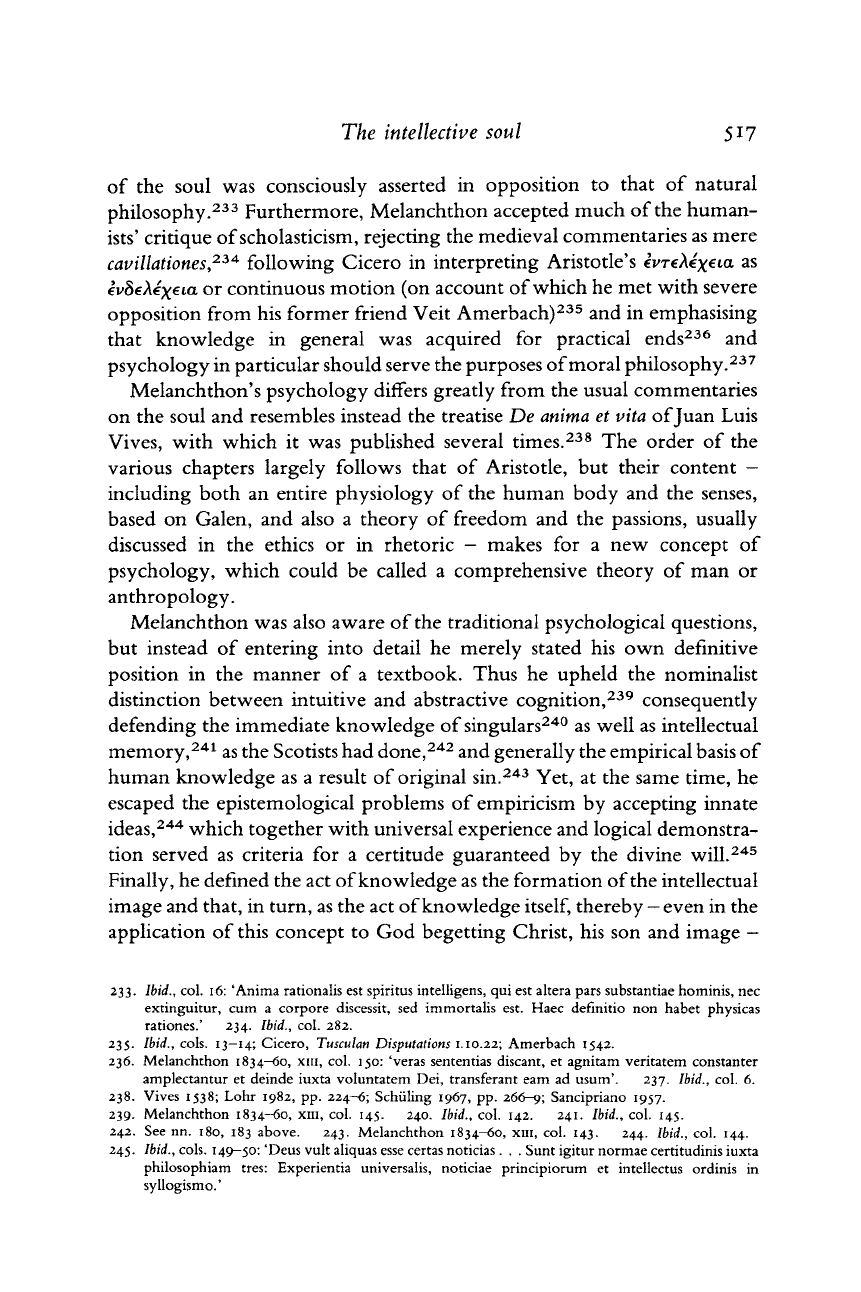
The intellective soul
517
of
the
soul
was
consciously asserted
in
opposition
to that of natural
philosophy.
233
Furthermore, Melanchthon accepted much
of the
human-
ists' critique
of
scholasticism, rejecting
the
medieval commentaries
as
mere
cavillationes
234
following
Cicero
in
interpreting Aristotle's ivreXex^ta
as
ivSeXex^ta
or
continuous motion
(on
account
of
which
he met
with severe
opposition from
his
former friend
Veit
Amerbach)
235
and in
emphasising
that
knowledge
in
general
was
acquired
for
practical ends
236
and
psychology
in
particular should serve
the
purposes
of
moral philosophy.
237
Melanchthon's psychology differs greatly from
the
usual commentaries
on
the
soul
and
resembles instead
the
treatise
De anima et
vita
of
Juan
Luis
Vives,
with which
it was
published several times.
238
The
order
of the
various chapters largely
follows
that of
Aristotle,
but
their content —
including both
an
entire physiology
of the
human body
and the
senses,
based
on
Galen,
and
also
a
theory
of
freedom
and the
passions, usually
discussed
in the
ethics
or in
rhetoric
-
makes
for a new
concept
of
psychology,
which could
be
called
a
comprehensive theory
of man or
anthropology.
Melanchthon
was
also aware
of the
traditional psychological questions,
but instead
of
entering into detail
he
merely stated
his own
définitive
position
in the
manner
of a
textbook. Thus
he
upheld
the
nominalist
distinction between intuitive
and
abstractive cognition,
239
consequently
defending
the
immediate knowledge
of
singulars
240
as
well
as
intellectual
memory,
241
as the
Scotists
had
done,
242
and
generally
the
empirical basis
of
human knowledge
as a
result
of
original sin.
243
Yet,
at the
same time,
he
escaped
the
epistemological problems
of
empiricism
by
accepting innate
ideas,
244
which together with universal experience
and
logical
demonstra-
tion served
as
criteria
for a
certitude guaranteed
by the
divine
will.
245
Finally,
he
defined
the act
of
knowledge
as the
formation
of
the intellectual
image
and that, in turn, as the act
of
knowledge
itself, thereby
—
even
in the
application
of
this concept
to God
begetting Christ,
his son and
image
—
233.
Ibid.,
col. 16: 'Anima rationalis est spiritus intelligens, qui est altera pars substantiae hominis, nec
extinguitur,
cum a corpore discessit, sed immortalis est. Haec definitio non habet physicas
rationes.' 234.
Ibid.,
col. 282.
235. Ibid.,
cols.
13-14;
Cicero,
Tusculan Disputations
1.10.22; Amerbach 1542.
236. Melanchthon 1834-60, xin, col. 150: 'veras sententias discant, et agnitam veritatem constanter
amplectantur
et deinde iuxta voluntatem Dei, transférant earn ad usum'. 237.
Ibid.,
col. 6.
238. Vives 1538; Lohr 1982, pp. 224-6; Schilling 1967, pp. 266-9; Sancipriano 1957.
239. Melanchthon 1834-60, xm, col. 145. 240.
Ibid.,
col. 142. 241.
Ibid.,
col. 145.
242. See nn. 180, 183 above. 243. Melanchthon 1834-60, xm, col. 143. 244.
Ibid.,
col. 144.
245.
Ibid.,
cols. 149-50: 'Deus vult aliquas
esse
certas noticias. . . Sunt igitur normae certitudinis iuxta
philosophiam très: Experientia universalis, noticiae principiorum et intellectus ordinis in
syllogisme'
Cambridge Histories Online © Cambridge University Press, 2008
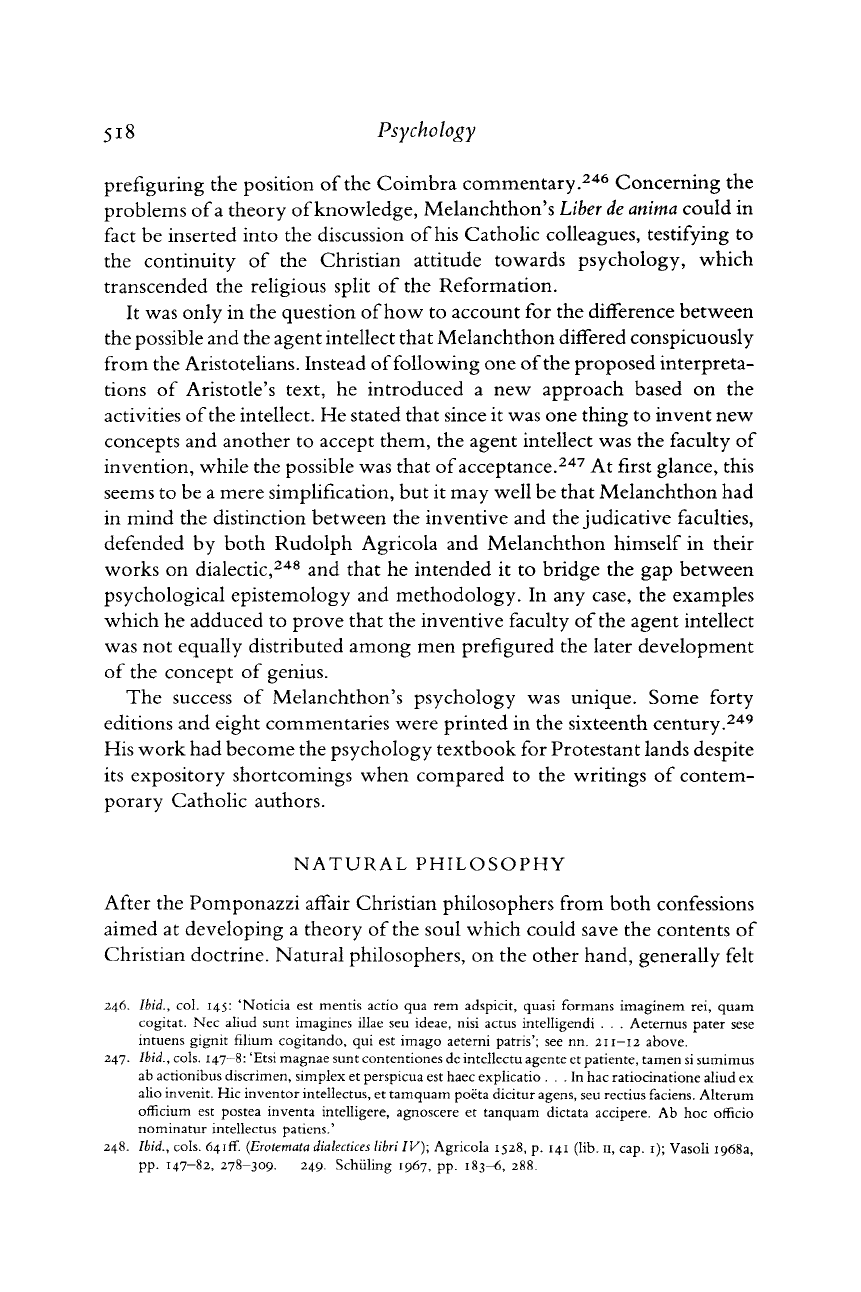
5
i8
Psychology
prefiguring
the
position
of the
Coimbra commentary.
246
Concerning
the
problems
of
a theory
of
knowledge,
Melanchthon's Liber de
anima
could
in
fact
be
inserted into
the
discussion
of
his Catholic colleagues, testifying
to
the continuity
of the
Christian
attitude
towards psychology, which
transcended
the
religious split
of the
Reformation.
It
was
only
in the
question
of
how
to
account
for the
difference between
the possible
and the
agent intellect
that
Melanchthon differed conspicuously
from
the
Aristotelians. Instead
of
following
one
of
the proposed
interpreta-
tions
of
Aristotle's text,
he
introduced
a new
approach based
on the
activities
of
the intellect.
He
stated
that
since
it
was
one
thing
to
invent
new
concepts
and
another
to
accept them,
the
agent intellect
was the
faculty
of
invention, while
the
possible was
that
of
acceptance.
247
At
first glance, this
seems
to be a
mere simplification,
but it may
well
be
that
Melanchthon
had
in mind
the
distinction between
the
inventive
and the
judicative faculties,
defended
by
both Rudolph
Agricola
and
Melanchthon himself
in
their
works
on
dialectic,
248
and
that
he
intended
it to
bridge
the gap
between
psychological
epistemology
and
methodology.
In any
case,
the
examples
which
he
adduced
to
prove
that
the
inventive faculty
of
the agent intellect
was
not
equally distributed among
men
prefigured
the
later development
of
the
concept
of
genius.
The
success
of
Melanchthon's psychology
was
unique. Some forty
editions
and
eight commentaries were
printed
in the
sixteenth century.
249
His work
had
become
the
psychology textbook
for
Protestant lands despite
its expository shortcomings when compared
to the
writings
of
contem-
porary Catholic authors.
NATURAL
PHILOSOPHY
After
the
Pomponazzi affair Christian philosophers from both confessions
aimed
at
developing
a
theory
of the
soul which could save
the
contents
of
Christian doctrine. Natural philosophers,
on the
other
hand,
generally felt
246.
Ibid.,
col. 145: 'Noticia est mentis actio qua rem adspicit, quasi formans imaginem rei, quam
cogitat.
Nec aliud sunt imagines illae seu ideae,
nisi
actus intelligendi . . . Aeternus pater
sese
intuens gignit filium cogitando, qui est imago aeterni patris'; see nn.
211-12
above.
247.
Ibid.,
cols.
147-8:
'Etsi magnae sunt contentiones de intellectu agente et patiente, tarnen si sumimus
ab
actionibus discrimen, simplex et perspicua est haec explicatio ... In hac ratiocinatione aliud ex
alio invenit. Hie inventor intellectus, et tamquam poeta dicitur agens, seu rectius faciens. Alterum
officium est postea inventa intelligere, agnoscere et tanquam dictata accipere. Ab hoc officio
nominatur intellectus patiens.'
248.
Ibid.,
cols.
641fr
(Erotemata
dialectices libri
IV); Agricola 1528, p. 141 (lib.
11,
cap. 1); Vasoli 1968a,
pp.
147-82,
278-309.
249. Schilling 1967, pp. 183-6, 288.
Cambridge Histories Online © Cambridge University Press, 2008
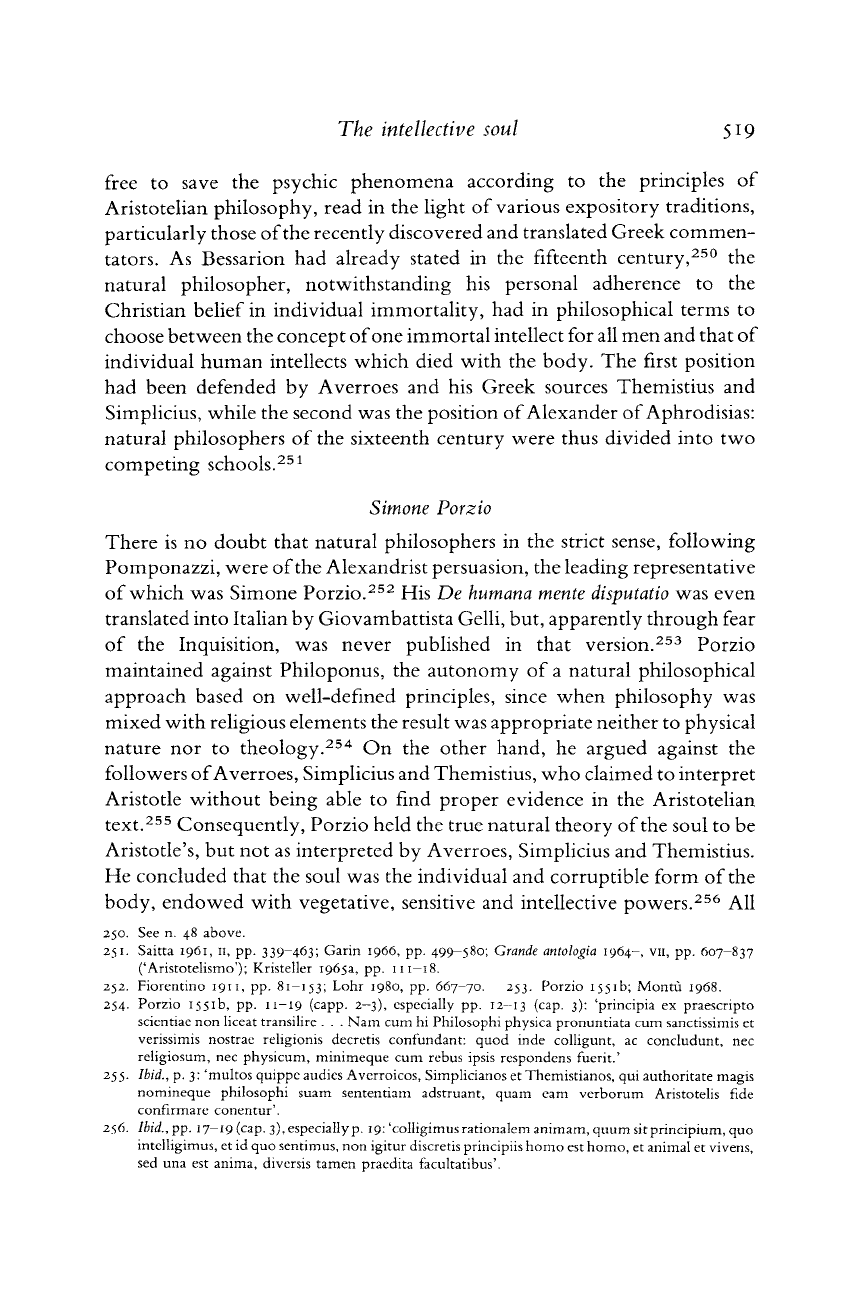
The intellective soul
519
free
to
save
the
psychic phenomena according
to the
principles
of
Aristotelian philosophy, read
in the
light
of
various expository traditions,
particularly those
of
the recently discovered
and
translated Greek commen-
tators.
As
Bessarion
had
already stated
in the
fifteenth century,
250
the
natural philosopher, notwithstanding
his
personal adherence
to the
Christian
belief
in
individual immortality,
had in
philosophical terms
to
choose between
the
concept
of
one immortal intellect
for
all
men and
that
of
individual human intellects which died with
the
body.
The
first position
had been defended
by
Averroes
and his
Greek sources Themistius
and
Simplicius,
while
the
second
was the
position
of
Alexander
of
Aphrodisias:
natural philosophers
of the
sixteenth century were
thus
divided into
two
competing schools.
251
Simone Porzio
There
is no
doubt
that
natural philosophers
in the
strict sense,
following
Pomponazzi,
were
of
the Alexandrist persuasion,
the
leading representative
of
which
was
Simone Porzio.
252
His De
humana mente disputatio
was
even
translated into Italian
by
Giovambattista
Gelli,
but,
apparently through fear
of
the
Inquisition,
was
never published
in
that
version.
253
Porzio
maintained against Philoponus,
the
autonomy
of a
natural philosophical
approach based
on
well-defined principles, since when philosophy
was
mixed
with religious elements
the
result was appropriate neither
to
physical
nature
nor to
theology.
254
On the
other hand,
he
argued against
the
followers
of
Averroes,
Simplicius
and
Themistius,
who
claimed
to
interpret
Aristotle
without being able
to
find proper evidence
in the
Aristotelian
text.
255
Consequently, Porzio held
the
true
natural theory
of
the soul
to be
Aristotle's,
but not as
interpreted
by
Averroes, Simplicius
and
Themistius.
He concluded
that
the
soul
was the
individual
and
corruptible form
of the
body,
endowed with vegetative, sensitive
and
intellective powers.
256
All
250. See n. 48 above.
251.
Saitta 1961, 11, pp. 339-463;
Garin
1966, pp.
499-580;
Grande antologia
1964-, vn, pp.
607-837
('Aristotelismo'); Kristeller 1965a, pp.
111-18.
252.
Fiorentino 1911, pp.
81-153;
Lohr
1980, pp. 667-70. 253. Porzio
1551b;
Montu 1968.
254. Porzio
1551b,
pp. 11-19 (capp. 2-3), especially pp. 12-13 (
ca
P- 3): 'principia ex praescripto
scientiae non liceat transilire . . . Nam cum hi Philosophi physica pronuntiata cum sanctissimis et
verissimis nostrae religionis decretis confundant: quod inde colligunt, ac concludunt, nec
religiosum, nec physicum, minimeque cum rebus
ipsis
respondens merit.'
255. Ibid.,
p. 3: 'multos quippe audies Averroicos, Simplicianos et Themistianos, qui authoritate magis
nomineque philosophi suam sententiam adstruant, quam earn verborum Aristotelis fide
confirmare conentur'.
256.
Ibid.,
pp. 17-19 (cap. 3), especially p. 19: 'colligimus rationalem animam, quum sitprincipium, quo
intelligimus, et id quo sentimus, non igitur discretis principiis homo est homo, et animal et vivens,
sed una est anima, diversis tamen praedita facultatibus'.
Cambridge Histories Online © Cambridge University Press, 2008
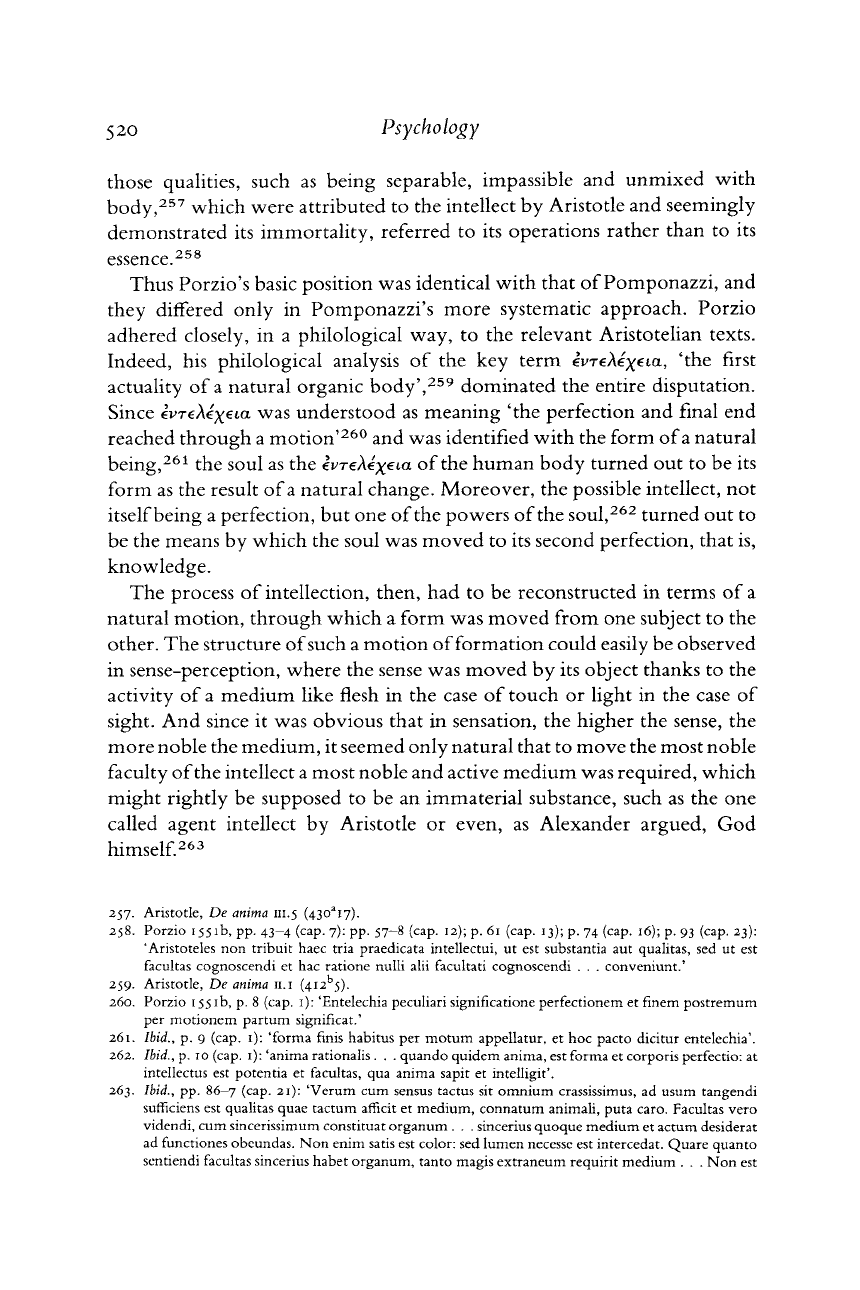
520
Psychology
those qualities, such
as
being separable, impassible
and
unmixed with
body,
257
which were attributed
to the
intellect
by
Aristotle
and
seemingly
demonstrated
its
immortality, referred
to its
operations
rather than to its
essence.
258
Thus Porzio's basic position
was
identical with
that of
Pomponazzi,
and
they differed only
in
Pomponazzi's more systematic approach. Porzio
adhered
closely,
in a
philological
way, to the
relevant Aristotelian texts.
Indeed,
his
philological analysis
of the key
term evreAexeta,
'the
first
actuality
of a natural
organic body',
259
dominated
the
entire disputation.
Since
ivreXex€ia
was
understood
as
meaning
'the
perfection
and
final
end
reached through
a
motion'
260
and
was identified with
the
form
of
a
natural
being,
261
the
soul
as the
ivreXex^ta
of the
human body
turned out to be its
form
as the
result
of
a
natural
change. Moreover,
the
possible intellect,
not
itself
being
a
perfection,
but one
of
the powers
of
the soul,
262
turned out to
be
the
means
by
which
the
soul
was
moved
to its
second perfection,
that is,
knowledge.
The
process
of
intellection, then,
had to be
reconstructed
in
terms
of a
natural
motion, through which
a
form
was
moved from
one
subject
to the
other.
The
structure
of
such
a
motion
of
formation could easily
be
observed
in sense-perception, where
the
sense
was
moved
by its
object thanks
to the
activity
of a
medium like flesh
in the
case
of
touch
or
light
in the
case
of
sight.
And
since
it was
obvious
that in
sensation,
the
higher
the
sense,
the
more noble
the
medium,
it
seemed only
natural
that to
move
the
most noble
faculty
of
the intellect
a
most noble
and
active medium was required, which
might rightly
be
supposed
to be an
immaterial substance, such
as the one
called
agent intellect
by
Aristotle
or
even,
as
Alexander argued,
God
himself
263
257.
Aristotle, De
anima 111.5
(430
a
i7).
258. Porzio
1551b,
pp. 43-4 (cap. 7): PP- 57-8 (cap. 12); p. 61 (cap. 13); p. 74 (cap. 16); p. 93 (cap. 23):
'Aristoteles non tribuit haec tria praedicata intellectui, ut est substantia aut qualitas, sed ut est
facultas cognoscendi et hac ratione nulli alii facultati cognoscendi . . . conveniunt.'
259. Aristotle, De
anima
11.1 (4i2
b
5).
260. Porzio
1551b,
p. 8 (cap. 1): 'Entelechia peculiari significatone perfectionem et finem postremum
per motionem partum significata
261. Ibid.,
p. 9 (cap. 1): 'forma
finis
habitus per motum appellatur, et hoc pacto dicitur entelechia'.
262.
Ibid.,
p. 10 (cap. 1): 'anima rationalis . . . quando quidem anima, est forma et corporis perfectio: at
intellectus est potentia et facultas, qua anima sapit et intelligit'.
263.
Ibid.,
pp.
86—7
(cap. 21): 'Verum cum
sensus
tactus sit omnium crassissimus, ad usum tangendi
sufficiens est qualitas quae tactum afficit et medium, connatum animali, puta caro. Facultas vero
videndi,
cum sincerissimum constituât Organum . . . sincerius quoque medium et actum desiderat
ad
functiones obeundas. Non enim
satis
est color: sed lumen
necesse
est intercédât. Quare quanto
sentiendi facultas sincerius habet Organum, tanto magis extraneum requirit medium . . . Non est
Cambridge Histories Online © Cambridge University Press, 2008
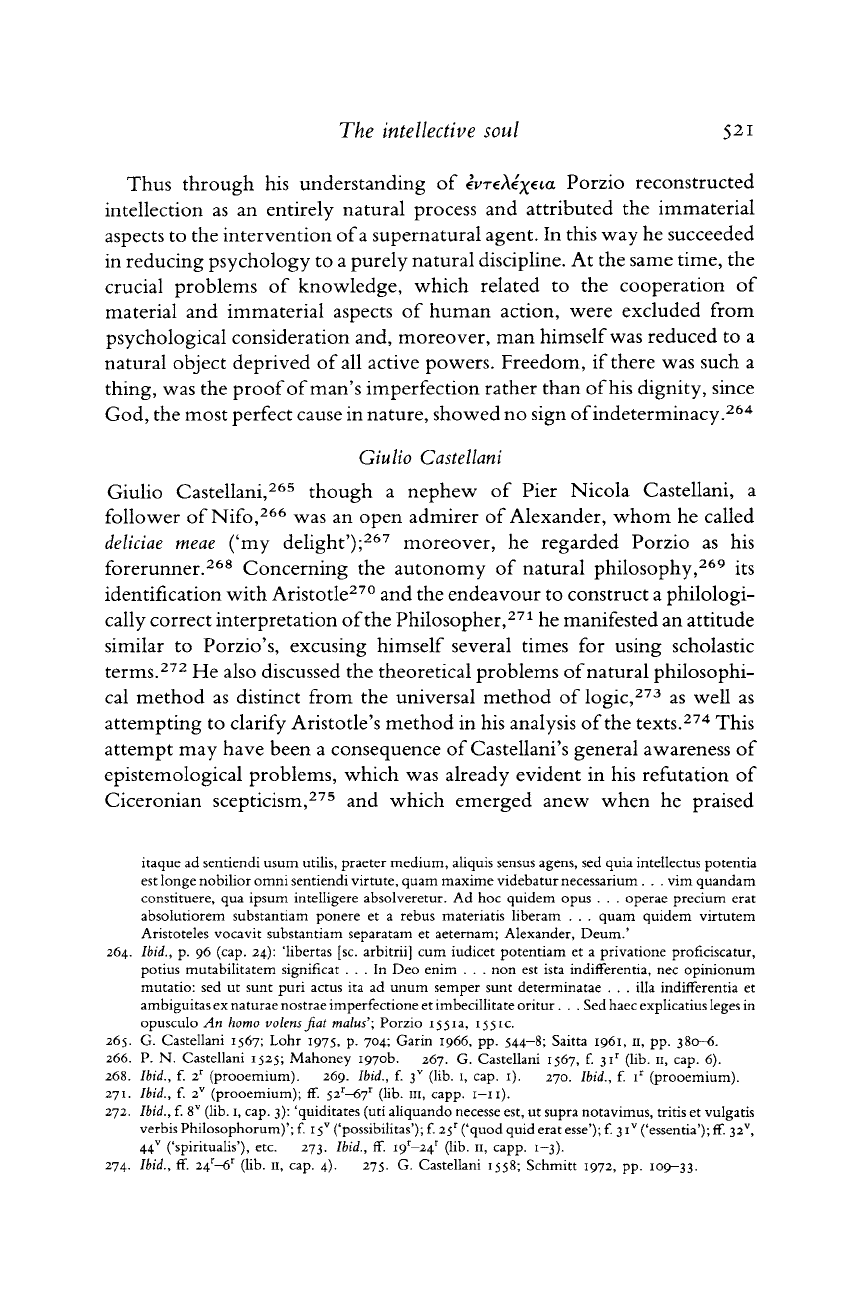
The intellective soul
521
Thus through
his
understanding
of
ivreXex^ta Porzio reconstructed
intellection
as an
entirely
natural
process
and
attributed
the
immaterial
aspects
to the
intervention
of
a supernatural agent.
In
this way
he
succeeded
in reducing psychology
to a
purely
natural
discipline.
At the
same time,
the
crucial problems
of
knowledge, which related
to the
cooperation
of
material
and
immaterial aspects
of
human action, were excluded from
psychological
consideration
and,
moreover,
man
himself was reduced
to a
natural
object deprived
of
all active powers. Freedom,
if
there
was
such
a
thing,
was the
proof
of
man's imperfection
rather than
of
his dignity, since
God,
the
most perfect cause
in
nature,
showed
no
sign
of
indeterminacy.
264
Giulio
Castellani
Giulio
Castellani,
265
though
a
nephew
of
Pier Nicola Castellani,
a
follower
of
Nifo,
266
was an
open admirer
of
Alexander, whom
he
called
deliciae
meae
('my
delight');
267
moreover,
he
regarded Porzio
as his
forerunner.
268
Concerning
the
autonomy
of natural
philosophy,
269
its
identification with Aristotle
270
and the
endeavour
to
construct
a
philologi-
cally
correct interpretation
of
the Philosopher,
271
he
manifested
an attitude
similar
to
Porzio's, excusing himself several times
for
using scholastic
terms.
272
He
also discussed
the
theoretical problems
of
natural
philosophi-
cal
method
as
distinct from
the
universal method
of
logic,
273
as
well
as
attempting
to
clarify Aristotle's method
in his
analysis
of
the texts.
274
This
attempt
may
have been
a
consequence
of
Castellani's general awareness
of
epistemological
problems, which
was
already evident
in his
refutation
of
Ciceronian
scepticism,
275
and
which emerged anew when
he
praised
itaque ad sentiendi usum utilis, praeter medium, aliquis
sensus
agens, sed quia intellectus potentia
est longe nobilior omni sentiendi virtute, quam maxime videbatur necessarium . . . vim quandam
constituere, qua ipsum intelligere absolveretur. Ad hoc quidem opus . . . operae precium erat
absolutiorem substantiam ponere et a rebus materiatis liberam . . . quam quidem virtutem
Aristoteles vocavit substantiam separatam et aeternam; Alexander, Deum.'
264.
Ibid.,
p. 96 (cap. 24): 'libertas [sc. arbitrii] cum iudicet potentiam et a privatione proficiscatur,
potius mutabilitatem significat ... In Deo enim . . . non est ista indifferentia, nec opinionum
mutatio:
sed ut sunt puri actus ita ad unum semper sunt determinatae . . . ilia indifferentia et
ambiguitas
ex naturae nostrae imperfectione et imbecillitate oritur. . . Sed haec explicatius leges in
opusculo An
homo volens
fiat
malus';
Porzio
1551a, 1551c.
265. G. Castellani 1567; Lohr 1975, p. 704; Garin 1966, pp. 544-8; Saitta 1961, 11, pp.
380-6.
266. P. N. Castellani 1525; Mahoney 1970b. 267. G. Castellani 1567, f. 3i
r
(lib. 11, cap. 6).
268.
Ibid.,
f. 2
r
(prooemium). 269.
Ibid.,
f. 3
V
(lib. 1, cap. 1). 270.
Ibid.,
f. i
r
(prooemium).
271.
Ibid.,
f. 2
V
(prooemium); ff. 52
r
-67
r
(lib. in, capp.
1-11).
272. Ibid.,
f. 8
V
(lib. 1, cap. 3): 'quiditates (uti aliquando
necesse
est, ut supra notavimus, tritis et vulgaris
verbis Philosophorum)'; f. I5
V
('possibilitas'); f. 25
r
('quod quid erat
esse');
f. 3 i
v
('essentia');
ff. 32
v
,
44
v
('spiritualis'), etc. 273.
Ibid.,
ff. I9
r
-24
r
(lib. 11, capp. 1-3).
274. Ibid.,
ff. 24
r
-6
r
(lib. 11, cap. 4). 275. G. Castellani 1558; Schmitt 1972, pp. 109-33.
Cambridge Histories Online © Cambridge University Press, 2008
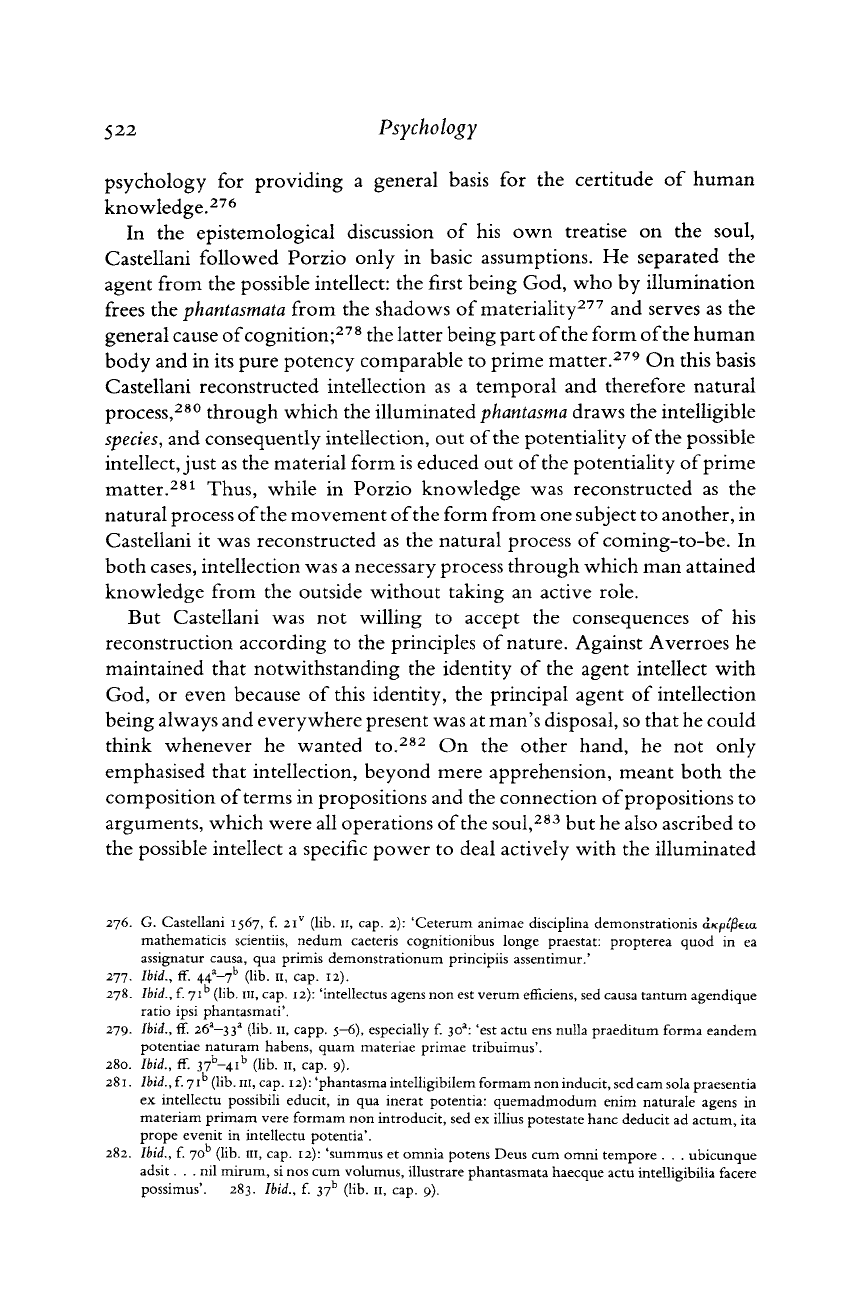
522
Psychology
psychology
for
providing
a
general basis
for the
certitude
of
human
knowledge.
276
In
the
epistemological discussion
of his own
treatise
on the
soul,
Castellani
followed
Porzio only
in
basic assumptions.
He
separated
the
agent from
the
possible intellect:
the
first being God,
who by
illumination
frees
the
phantastnata
from
the
shadows
of
materiality
277
and
serves
as the
general cause
of
cognition;
278
the
latter being
part
of
the form
of
the human
body
and in its
pure potency comparable
to
prime
matter.
279
On
this basis
Castellani
reconstructed intellection
as a
temporal
and
therefore natural
process,
280
through which
the
illuminated
phantasma
draws
the
intelligible
species,
and
consequently intellection,
out
of
the potentiality
of
the possible
intellect, just
as the
material form
is
educed
out
of
the potentiality
of
prime
matter.
281
Thus, while
in
Porzio knowledge
was
reconstructed
as the
natural process
of
the movement
of
the form from
one
subject
to
another,
in
Castellani
it was
reconstructed
as the
natural process
of
coming-to-be.
In
both cases, intellection was
a
necessary process through which
man
attained
knowledge
from
the
outside without taking
an
active role.
But
Castellani
was not
willing
to
accept
the
consequences
of his
reconstruction according
to the
principles
of
nature. Against Averroes
he
maintained
that
notwithstanding
the
identity
of the
agent intellect with
God,
or
even because
of
this identity,
the
principal agent
of
intellection
being always
and
everywhere present was
at
man's disposal,
so
that
he
could
think whenever
he
wanted to.
282
On the
other hand,
he not
only
emphasised
that
intellection, beyond mere apprehension, meant both
the
composition
of
terms
in
propositions
and the
connection
of
propositions
to
arguments, which were
all
operations
of
the soul,
283
but he
also ascribed
to
the possible intellect
a
specific power
to
deal actively with
the
illuminated
276.
G. Castellani 1567, f. 2i
v
(lib. II, cap. 2): 'Ceterum animae disciplina demonstrationis a/cpijSeia
mathematicis scientiis, nedum caeteris cognitionibus longe praestat: propterea quod in ea
assignatur causa, qua primis demonstrationum principiis assentimur.'
277. Ibid.,
ff. 44
a
-7
b
(lib. 11, cap. 12).
278. Ibid.,
f. 7i
b
(lib. in, cap. 12): 'intellectus agens non est verum emciens, sed causa tantum agendique
ratio ipsi phantasmati'.
279. Ibid.,
ff. 26
a
~33
a
(lib.
11,
capp.
5-6), especially f. 30
a
: 'est actu ens nulla praeditum forma eandem
potentiae naturam habens, quam materiae primae tribuimus'.
280.
Ibid.,
ff. 37
b
~4i
b
(lib. 11, cap. 9).
281. Ibid.,
f. 7i
b
(lib. in, cap. 12): 'phantasma intelligibilem formam non inducit, sed earn
sola
praesentia
ex intellectu possibili educit, in qua inerat potentia: quemadmodum enim naturale agens in
materiam primam vere formam non introducit, sed ex
illius
potestate hanc deducit ad actum, ita
prope evenit in intellectu potentia'.
282.
Ibid.,
f. 70
b
(lib. in, cap. 12): 'summus et omnia potens Deus cum omni tempore . . . ubicunque
adsit... nil mirum, si nos cum volumus, illustrare phantasmata haecque actu intelligibilia facere
possimus'. 283.
Ibid.,
f. 37
b
(lib. 11, cap. 9).
Cambridge Histories Online © Cambridge University Press, 2008
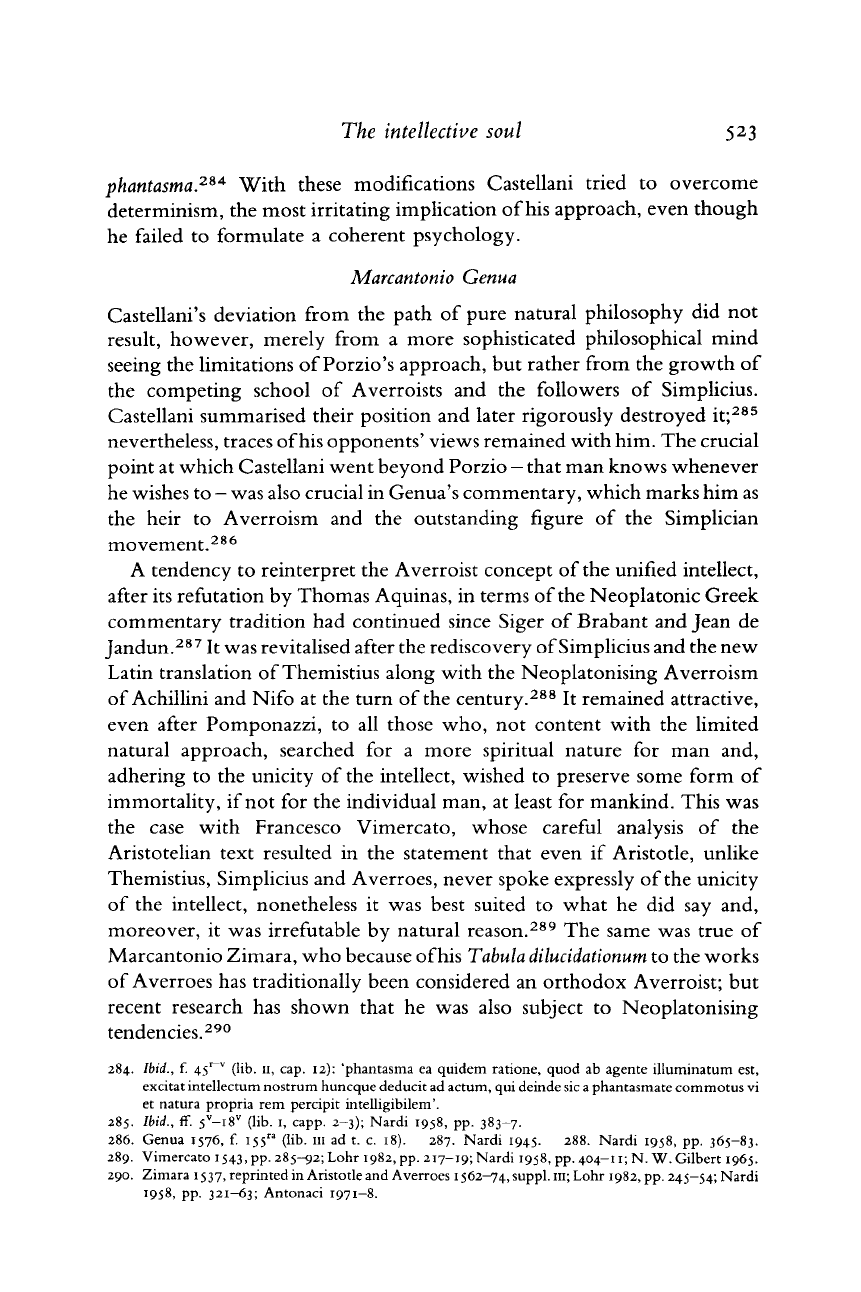
The intellective soul
523
phantasma
284
With these modifications Castellani tried to overcome
determinism, the most irritating implication
of
his approach, even though
he failed to formulate a coherent psychology.
Marcantonio Genua
Castellani's deviation from the path of pure natural philosophy did not
result, however, merely from a more sophisticated philosophical mind
seeing
the limitations
of
Porzio's
approach, but
rather
from the growth of
the competing school of Averroists and the followers of Simplicius.
Castellani
summarised their position and later rigorously destroyed it;
285
nevertheless, traces
of
his opponents'
views
remained with him. The crucial
point at which Castellani went beyond Porzio
—
that
man knows whenever
he wishes to
—
was also crucial in Genua's commentary, which marks him as
the heir to Averroism and the outstanding figure of the Simplician
movement.
286
A
tendency to reinterpret the Averroist concept of the unified intellect,
after its refutation by Thomas Aquinas, in terms of the Neoplatonic Greek
commentary tradition had continued since Siger of Brabant and
Jean
de
Jandun.
287
It was revitalised after the rediscovery
of
Simplicius
and the new
Latin translation of Themistius along with the Neoplatonising Averroism
of
Achillini
and
Nifo
at the
turn
of the century.
288
It remained attractive,
even
after Pomponazzi, to all those who, not content with the limited
natural approach, searched for a more spiritual
nature
for man and,
adhering to the unicity of the intellect, wished to preserve some form of
immortality, if not for the individual man, at least for mankind. This was
the case with Francesco Vimercato, whose careful analysis of the
Aristotelian text resulted in the statement
that
even if Aristotle, unlike
Themistius, Simplicius and Averroes, never spoke expressly of the unicity
of
the intellect, nonetheless it was best suited to what he did say and,
moreover, it was irrefutable by natural reason.
289
The same was
true
of
Marcantonio Zimara, who because
of
his Tabula dilucidationum to the works
of
Averroes has traditionally been considered an orthodox Averroist; but
recent research has shown
that
he was also subject to Neoplatonising
tendencies.
290
284. Ibid., f.
45
r_v
(lib. 11, cap. 12):
'phantasma
ea
quidem
ratione,
quod
ab
agente
illuminatum
est,
excitat
intellectum
nostrum
huncque
deducit
ad
actum,
qui
deinde
sic a
phantasmate
commotus
vi
et
natura
propria
rem
percipit
intelligibilem'.
285. Ibid., ff.
5
v
-i8
v
(lib. 1,
capp.
2-3);
Nardi
1958, pp.
383-7.
286.
Genua
1576, f. 155" (lib. in ad t. c. 18). 287.
Nardi
1945. 288.
Nardi
1958, pp.
365-83.
289.
Vimercato
1543, pp.
285-92;
Lohr
1982, pp. 217-19;
Nardi
1958, pp.
404-u;
N. W.
Gilbert
1965.
290.
Zimara
1537,
reprinted
in
Aristotle
and
Averroes
1562-74,
suppl.
m;
Lohr
1982, pp.
245-54;
Nardi
1958, pp.
321-63;
Antonaci
1971-8.
Cambridge Histories Online © Cambridge University Press, 2008
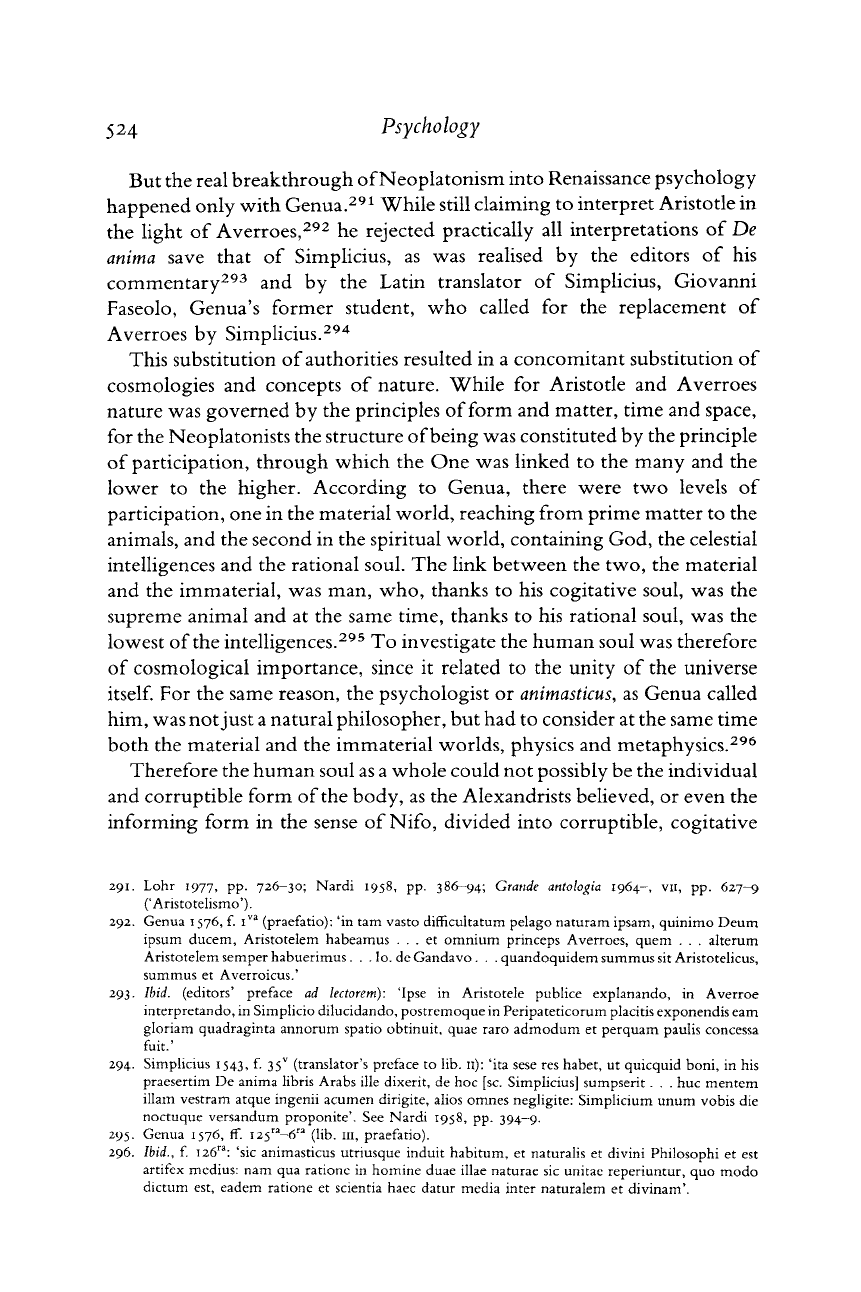
524
Psychology
But
the
real breakthrough
of
Neoplatonism into Renaissance psychology
happened only with Genua.
291
While still claiming
to
interpret Aristotle
in
the light
of
Averroes,
292
he
rejected practically
all
interpretations
of De
anima save
that
of
Simplicius,
as was
realised
by the
editors
of his
commentary
293
and by the
Latin translator
of
Simplicius, Giovanni
Faseolo,
Genua's former student,
who
called
for the
replacement
of
Averroes
by
Simplicius.
294
This
substitution
of
authorities resulted
in a
concomitant substitution
of
cosmologies
and
concepts
of
nature. While
for
Aristotle
and
Averroes
nature
was
governed
by the
principles
of
form
and
matter,
time
and
space,
for
the
Neoplatonists
the
structure
of
being
was constituted
by the
principle
of
participation, through which
the One was
linked
to the
many
and the
lower
to the
higher. According
to
Genua,
there
were
two
levels
of
participation,
one in the
material world, reaching from prime matter
to the
animals,
and the
second
in the
spiritual world, containing God,
the
celestial
intelligences
and the
rational soul.
The
link between
the
two,
the
material
and
the
immaterial,
was man, who,
thanks
to his
cogitative soul,
was the
supreme animal
and at the
same time, thanks
to his
rational soul,
was the
lowest
of
the intelligences.
295
To
investigate
the
human soul
was
therefore
of
cosmological importance, since
it
related
to the
unity
of the
universe
itself.
For the
same reason,
the
psychologist
or
animasticus,
as
Genua called
him, was not just
a
natural philosopher,
but had to
consider
at the
same time
both
the
material
and the
immaterial worlds, physics
and
metaphysics.
296
Therefore
the
human soul
as a
whole could
not
possibly
be the
individual
and corruptible form
of
the body,
as the
Alexandrists believed,
or
even
the
informing form
in the
sense
of
Nifo,
divided into corruptible, cogitative
291.
Lohr
1977, pp. 726-30; Nardi 1958, pp.
386-94;
Grande antologia
1964-, vn, pp. 627-9
('Aristotelismo').
292. Genua 1576, f. i
va
(praefatio): 'in tarn vasto difficultatum pelago naturam ipsam, quinimo Deum
ipsum ducem, Aristotelem habeamus ... et omnium princeps Averroes, quem . . . alterum
Aristotelem semper habuerimus. . . Io. de Gandavo . . . quandoquidem summus sit Aristotelicus,
summus
et Averroicus.'
293.
Ibid,
(editors' preface ad
lectorem):
'Ipse in Aristotele publice explanando, in Averroe
interpretando, in Simplicio dilucidando, postremoque in Peripateticorum placitis exponendis earn
gloriam quadraginta annorum spatio obtinuit, quae raro admodum et perquam paulis concessa
fuit.'
294. Simplicius 1543. f- 35
v
(translator's preface to lib. 11): 'ita
sese
res habet, ut quicquid boni, in his
praesertim De anima libris
Arabs
ille
dixerit, de hoc [sc. Simplicius] sumpserit . . . hue mentem
illam vestram atque ingenii acumen dirigite,
alios
omnes
negligite: Simplicium unum vobis die
noctuque versandum proponite'. See Nardi 1958, pp.
394-9.
295. Genua 1576, ff. i25
ra
-6
ra
(lib. in, praefatio).
296.
Ibid.,
f.
I26
ra
:
'sic animasticus utriusque induit habitum, et naturalis et divini Philosophi et est
artifex
medius: nam qua ratione in homine duae illae naturae sic unitae reperiuntur, quo modo
dictum est, eadem ratione et scientia haec datur media inter naturalem et divinam'.
Cambridge Histories Online © Cambridge University Press, 2008
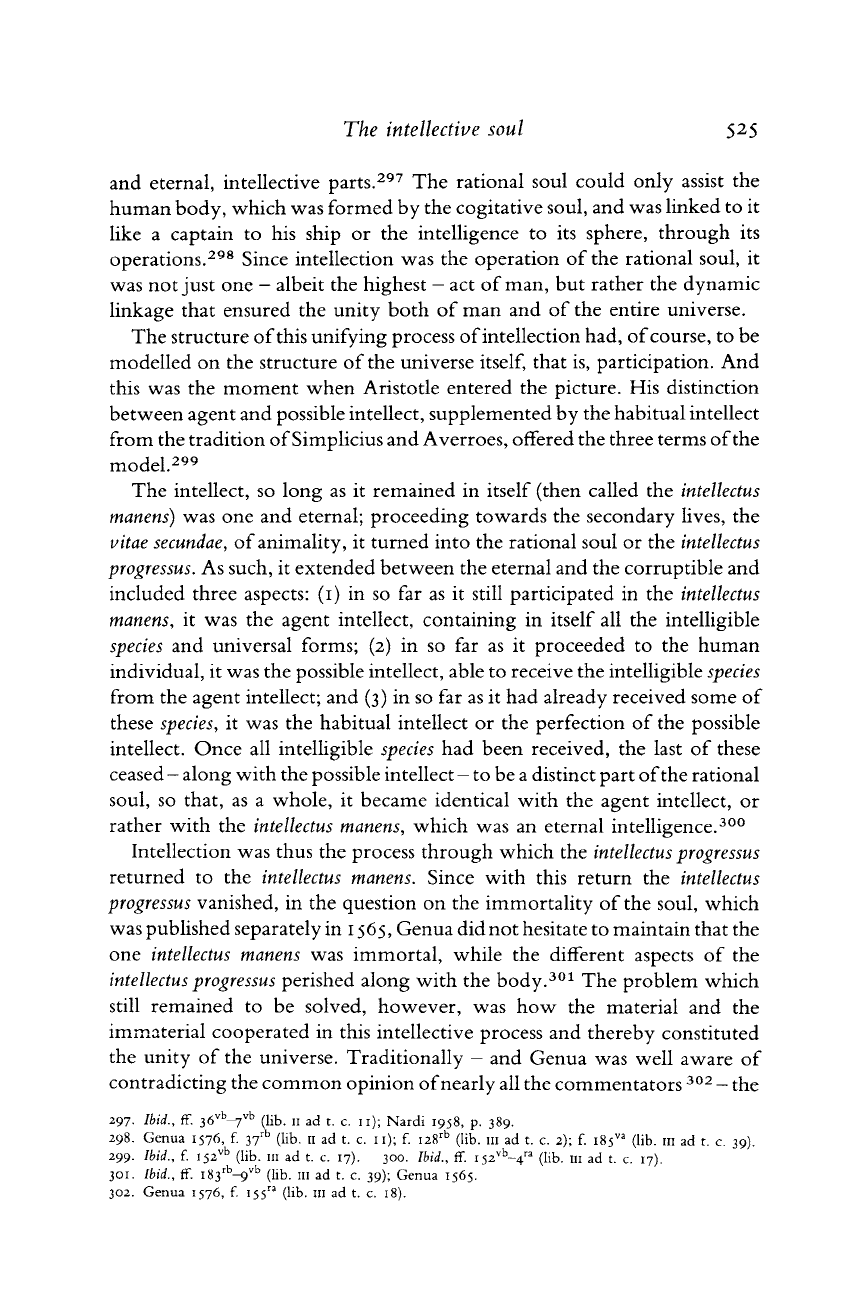
The intellective soul
525
and eternal, intellective parts.
297
The rational soul could only assist the
human body, which was formed by the cogitative soul, and was linked to it
like
a captain to his ship or the intelligence to its sphere, through its
operations.
298
Since intellection was the operation of the rational soul, it
was
not just one
—
albeit the highest
—
act of man, but
rather
the dynamic
linkage
that
ensured the unity both of man and of the entire universe.
The
structure
of
this unifying process
of
intellection had,
of
course, to be
modelled on the structure of the universe itself,
that
is, participation. And
this was the moment when Aristotle entered the picture. His distinction
between agent and possible intellect, supplemented by the habitual intellect
from the tradition
of
Simplicius
and Averroes, offered the
three
terms
of
the
model.
299
The
intellect, so long as it remained in itself (then called the intellectus
manens)
was one and eternal; proceeding towards the secondary
lives,
the
vitae secundae, of animality, it
turned
into the rational soul or the intellectus
progressus. As such, it extended between the eternal and the corruptible and
included
three
aspects: (1) in so far as it still participated in the intellectus
manens, it was the agent intellect, containing in itself all the intelligible
species
and universal forms; (2) in so far as it proceeded to the human
individual, it was the possible intellect, able to receive the intelligible species
from the agent intellect; and (3) in so far as it had already received some of
these species, it was the habitual intellect or the perfection of the possible
intellect. Once all intelligible species had been received, the last of these
ceased - along with the possible intellect - to be a distinct
part
of
the rational
soul,
so
that,
as a whole, it became identical with the agent intellect, or
rather
with the intellectus manens, which was an eternal intelligence.
300
Intellection was
thus
the process through which the intellectus progressus
returned to the intellectus manens. Since with this
return
the intellectus
progressus vanished, in the question on the immortality of the soul, which
was
published separately in
1565,
Genua did not hesitate to maintain
that
the
one intellectus
manens
was immortal, while the different aspects of the
intellectus progressus perished along with the body.
301
The problem which
still
remained to be solved, however, was how the material and the
immaterial cooperated in this intellective process and thereby constituted
the unity of the universe. Traditionally - and Genua was
well
aware of
contradicting the common opinion
of
nearly all the commentators
302
—
the
297. Ibid., ff.
36
vb
-7
vb
(lib. 11 ad t. c. n);
Nardi
1958, p. 389.
298.
Genua
1576, f.
37
rb
(lib. 11 ad t. c. 11); f.
i28
rb
(lib. 111 ad t. c. 2); f. 185™ (lib. in ad t. c. 39).
299. Ibid., f.
i52
vb
(lib. in ad t. c. 17). 300. Ibid., ff.
i52
vb
-4
ra
(lib. m ad t. c. 17).
301. Ibid., ff.
i83
rb
-9
vb
(lib. in ad t. c. 39);
Genua
1565.
302.
Genua
1576, f. 155
ra
(lib. m ad t. c. 18).
Cambridge Histories Online © Cambridge University Press, 2008
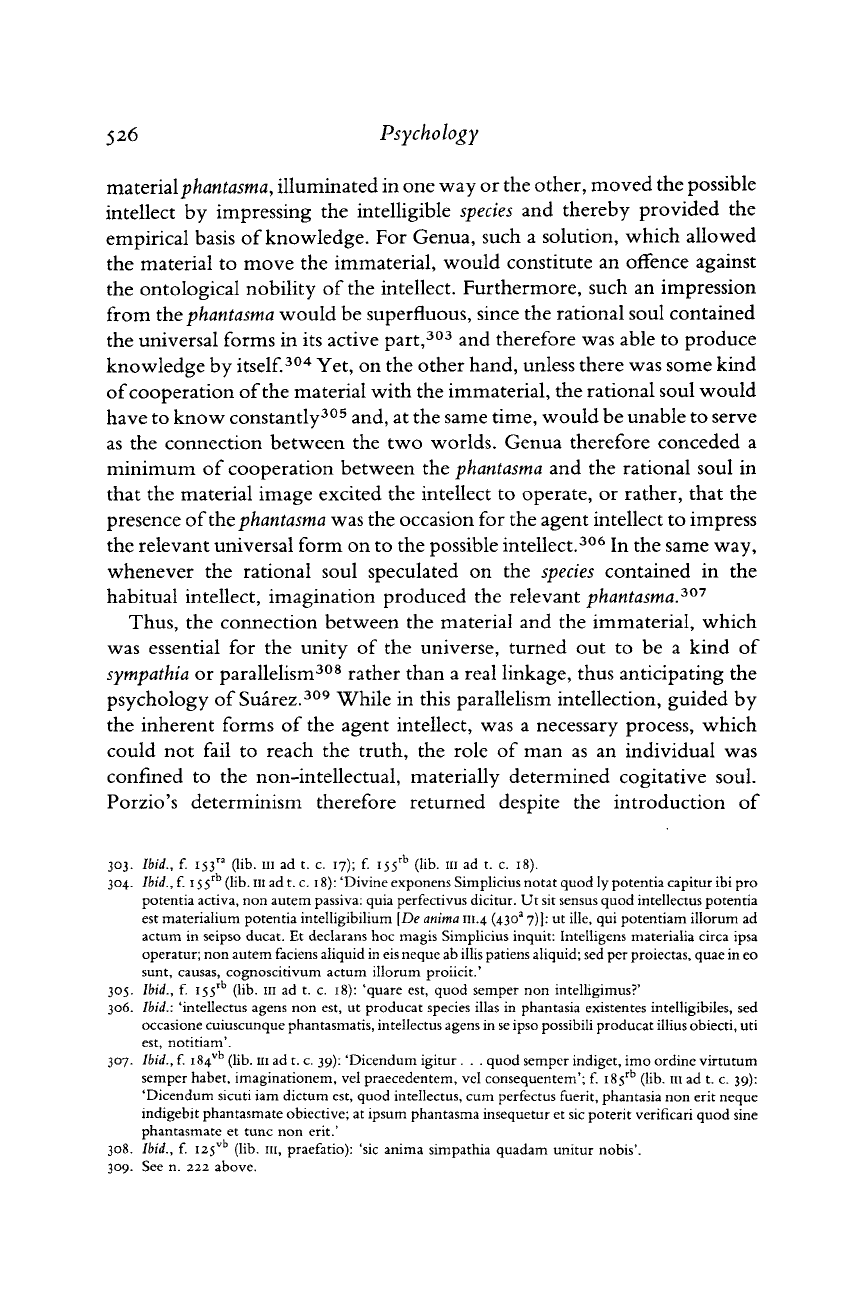
526 Psychology
material phantasma, illuminated
in one
way
or the
other, moved
the
possible
intellect
by
impressing
the
intelligible species
and
thereby provided
the
empirical basis
of
knowledge.
For
Genua, such
a
solution, which allowed
the material
to
move
the
immaterial, would constitute
an
offence against
the ontological nobility
of the
intellect. Furthermore, such
an
impression
from
the
phantasma
would
be
superfluous, since
the
rational soul contained
the universal forms
in its
active
part,
303
and
therefore
was
able
to
produce
knowledge
by
itself.
304
Yet,
on the
other hand, unless
there
was some kind
of
cooperation
of
the material with
the
immaterial,
the
rational soul would
have
to
know constantly
305
and, at the
same time, would
be
unable
to
serve
as
the
connection between
the two
worlds. Genua therefore conceded
a
minimum
of
cooperation between
the
phantasma
and the
rational soul
in
that
the
material image excited
the
intellect
to
operate,
or
rather,
that
the
presence
of
the
phantasma
was
the
occasion
for the
agent intellect
to
impress
the relevant universal form
on to the
possible intellect.
306
In the
same way,
whenever
the
rational soul speculated
on the
species contained
in the
habitual intellect, imagination produced
the
relevant phantasma
301
Thus,
the
connection between
the
material
and the
immaterial, which
was
essential
for the
unity
of the
universe,
turned
out to be a
kind
of
sympathia
or
parallelism
308
rather
than
a
real linkage,
thus
anticipating
the
psychology
of
Suarez.
309
While
in
this parallelism intellection, guided
by
the inherent forms
of the
agent intellect,
was a
necessary process, which
could
not
fail
to
reach
the truth, the
role
of man as an
individual
was
confined
to the
non-intellectual, materially determined cogitative soul.
Porzio's
determinism therefore returned despite
the
introduction
of
303.
Ibid.,
f.
I53
ra
(Hb. in ad t. c. 17); f. i55
rb
(lib. ш ad t. c. 18).
304.
Ibid.,
f.
155
rb
(lib. in ad t. c. 18): 'Divine exponens Simplicius notat quod ly potentia capitur ibi pro
potentia activa, non autem passiva: quia perfectivus dicitur. Ut sit
sensus
quod intellectus potentia
est materialium potentia intelligibilium [De
anima
111.4
(430
s
7)]: ut ille, qui potentiam illorum ad
actum
in
seipso
ducat. Et declarans hoc magis Simplicius inquit: Intelligens materialia circa ipsa
operatur;
non autem faciens aliquid in eis neque ab
illis
patiens aliquid; sed per proiectas, quae in eo
sunt, causas, cognoscitivum actum illorum proiicit.'
305.
Ibid.,
f.
155
rb
(lib. in ad t. c. 18): 'quare est, quod semper non intelligimus?'
306.
Ibid.:
'intellectus agens non est, ut producat
species
illas in phantasia
existentes
intelligibiles, sed
occasione cuiuscunque phantasmatis, intellectus agens in se
ipso
possibili producat
illius
obiecti, uti
est, notitiam'.
307.
Ibid.,
f.
i84
vb
(lib. in ad t. c. 39): 'Dicendum igitur . . . quod semper indiget, imo ordine virtutum
semper habet, imaginationem, vel praecedentem, vel consequentem'; f.
i8s
rb
(lib. ш ad t. c. 39):
'Dicendum sicuti iam dictum est, quod intellectus, cum perfectus fuerit, phantasia non erit neque
indigebit phantasmate obiective; at ipsum phantasma insequetur et sic poterit verificari quod
sine
phantasmate et tunc non erit.'
308.
Ibid.,
f. I25
vb
(lib. in, praefatio): 'sic anima simpathia quadam unitur nobis'.
309. See n. 222 above.
Cambridge Histories Online © Cambridge University Press, 2008
